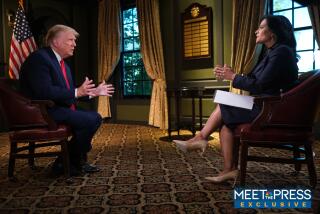Your name, please
- Share via
Has David Shaw ever written about the frequent use of unnamed sources in less important stories? I’ve had reporters who say, “The guy didn’t want to give me his name” in a story about bar patron reaction to a 2 a.m. closing time law.
I also produce stories for public radio and am a careful listener. In man- and woman-on-the-street interviews, names are often missing. It drives me crazy!
My hunch is that reporters are taking “no” for an answer too quickly. My experience has been that most people agree to have their names in the paper once you explain why. Failing that, I beg. Or, I tell the person that my editor will get mad at me (which he should) if I can’t get the source’s name. Most people can relate to the wrath of an angry boss.
Todd Melby
Minneapolis
Todd Melby is the editor of Seward Profile, a Minneapolis newspaper
*
As usual, David Shaw is right on target. Blind sources are often little more than character assassins creating ambush, and the journalist serves as enabler.
Actually, I’d go a step further. We’re not merely talking about people with bad intentions who use the press as an amplifier. Often the press begins and promotes the process.
My personal feeling is that there are a number of people in this town I think are less nice than the public perceives them and that it would probably be a good thing if the public was more aware of their flaws. Insofar as I would be willing to cause them discomfort, I should put my name on the line, thereby providing some context and allowing them the opportunity to be equally critical of me if that’s what they choose.
Jim Jaffe
Washington
More to Read
Sign up for Essential California
The most important California stories and recommendations in your inbox every morning.
You may occasionally receive promotional content from the Los Angeles Times.












